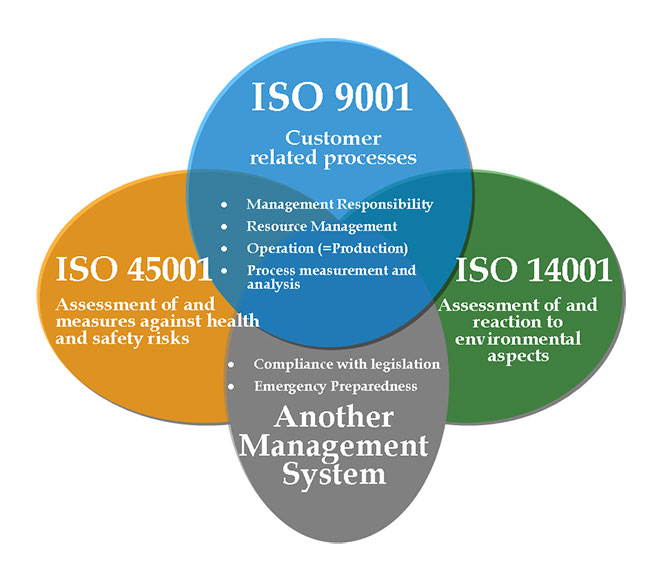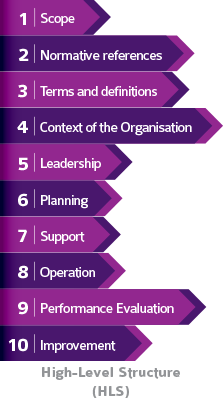Services: Integrated Management Systems
There is an ever-increasing competition in the market with a higher awareness of both environmental and health & safety performance for companies. This awareness is driving businesses to implement three of the ISO standards, ISO 9001, ISO 14001, ISO27001 and ISO 45001.
Many companies have seen the benefit of implementing these standards, as they provide focus on different and important aspects of the organization; the Quality Management System (QMS) for ISO 9001, the Environmental Management System (EMS) for ISO 14001, Information Security Management System (ISMS) for 27001 and the Occupational Health & Safety Management System (OHSMS) for ISO 45001.
With the release of the new versions of these standards in the last few years, the best option is to integrate the standard requirements and create an Integrated Management System (IMS). Implementation of the standards at the same time, but separately, can compound the challenges and even things that seem easy during implementation of one standard can become problematic.
Since the complexity of implementation grows with more than one standard, the necessity of the systematic approach was never so crucial.
Integrate your management systems to reduce duplication and improve efficiency. If you are currently running separate management systems, get in touch to see how you could make potential savings.
In today's competitive business environment, streamlining operations is essential to keeping overhead costs low. Key principles of lean management include eliminating redundancies and consolidating systems. Implementing an integrated management system provides a framework for doing just this. When you integrate your management systems, you reduce duplication and improve efficiency.
Integrated management systems provide greater benefit than running separate management systems in parallel. If you are currently running separate management systems, get in touch to see how you could make potential savings.

The Integrated Management System services provided by QSP Solutions include:
- Implementation and operation of Integrated Management System to meet the requirements of ISO9001, ISO14001, ISO27001 and ISO45001 based on PAS 99.
- Policy statement, objectives and procedures.
- Identifying compliance with relevant regulations.
- Development of Integrated Management Programmes.
- Delivery to staff of employee Integrated Management System Awareness training sessions.
- Undertake and manage Integrated internal audit programme, including audits, audit reports and support through to resolution of any issues arising.
- Liaison with the chosen certification body for certification to ISO9001, ISO14001, ISO27001 and ISO45001.
- Maintenance of the Integrated Management System post certification.
The program will include:
- Integrated Management Processes
- Integrated Operational Process
- Risk Management Processes
- Integrated Management Reviews
- Integrated Objectives and Improvement Processed
- Integrated Internal Audits
An Integrated Management System Action Plan is available by [clicking here]
What are Integrated Management Systems?
An integrated management system is a single system designed to manage multiple aspects of an organization’s operations in line with multiple standards, such as those for quality, environmental and health and safety management.
Most businesses already have systems — either formal or informal — for dealing with these issues; however, what many managers don't realize is the degree to which they are duplicating processes or creating unnecessary extra work for their staff.
Ultimately, safety, environmental management and quality control have many common points, and all work towards the goal of making your organization more effective and efficient.
In practice, an integrated management system involves merging existing formal systems and implementing specific best practices organization-wide.
Benefits of Integration
In an integrated management system, the whole is greater than the sum of its parts.
Successfully integrating your management systems can have a number of very tangible benefits for your organization, including:
- Integrated Management Processes
- Integrated Operational Process
- Risk Management Processes
- Integrated Management Reviews
- Integrated Objectives and Improvement Processed
- Integrated Internal Audits
Management Integration and Certification
Most businesses are aware of the value of certification under ISO 9001, ISO 14001, ISO 45001 and other management system standards. It's important to remember that the purpose of ISO and other standards is to help you run a better organization. If your management systems are causing your staff to duplicate work unnecessarily, they aren't delivering the value they should be.
Annex SL and Integration
Annex SL is the document that defines the high-level structure for all ISO management systems standards. Annex SL is designed to better facilitate the use of integrated management systems, providing organizations with the tools they need to streamline current protocol, encourage standardization and transform existing management systems into an integrated model.
The common structure has been introduced in the latest ISO 9001 and ISO 14001 standards and will also be used in ISO 45001. This will make the standards more compatible and enable more effective integration. Aside from the other benefits of consolidation, adopting integrated management systems now will ease the transition into this model.

- Scope
- Normative references
- Terms and definitions
- Context of the organization
- Leadership
- Planning
- Support
- Operation
- Performance evaluation
- Improvement
Why Integrate?
Having multiple management systems implemented separately will increase the time and resources needed for maintenance. This includes performing the same activity more than once, such as internal audit or management review, not to mention the proliferation of documentation to support the management systems.
In some cases, each standard is implemented by a different team or group, so the systems may follow different logic or have different structures. Also, the documents and processes that are common for the standards can be established differently, thus bringing added confusion to an already complex system. Having separate management systems inside of one company can easily be turned into an organizational nightmare, and instead of benefiting to the business, they become a burden that everyone tries to avoid.
On the other hand, having one Integrated Management System that meets the requirements of all the standards facilities an easier maintenance and coordination of activities. One quick glance at the text of the standards shows that there is a great similarity between the requirements, especially now that they are all aligned with Annex SL.
A briefing on Integrated Management Systems is available by [clicking here]

 Services
Services

